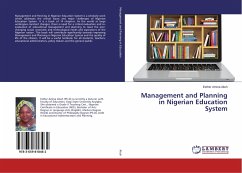
Nigerian Economy and its University System-An Overview
Versandkostenfrei!
Versandfertig in 6-10 Tagen
27,99 €
inkl. MwSt.

PAYBACK Punkte
14 °P sammeln!
Nigeria as a British colony got her independence in 1960 and the year marked a turning point and a beginning of the new era of socio-economic development of the country. In the last 54 years of its existence as an independent country, Nigeria has experienced many transformations. As indicated by Benhin and Barbier (1999); EY (2014), at the early stage, Nigeria depended on agriculture as the sector accounted for over 90 percent of the GDP in the early 1960's and that constituted two thirds of the employments in the country when Nigeria's major exports were cocoa, groundnuts (peanuts), rubber an...
Nigeria as a British colony got her independence in 1960 and the year marked a turning point and a beginning of the new era of socio-economic development of the country. In the last 54 years of its existence as an independent country, Nigeria has experienced many transformations. As indicated by Benhin and Barbier (1999); EY (2014), at the early stage, Nigeria depended on agriculture as the sector accounted for over 90 percent of the GDP in the early 1960's and that constituted two thirds of the employments in the country when Nigeria's major exports were cocoa, groundnuts (peanuts), rubber and palm oil. According to World Bank (2008) cocoa and groundnut (peanut) production development was 300,000 and 500,000 tons respectively. In the early 1960's, Nigeria's economy was also developing very well in products such as cassava as Nigeria was the largest producer in Africa between 1960 - 1970's while other products included palm oil, rubber and rice also kept the economy progressing until the country experienced the fossil oil boom, industry explorations, abandoning agriculture.












